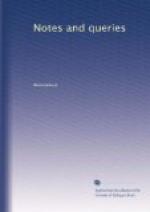L.
In addition to the remarks of your correspondent L., I may state that the first edition in 1737, 8vo., contains 335 pages, exclusive of the publisher’s address, 13 pages. It is printed for T. Cooper, at the Globe, in Paternoster Row. The second edition in 1748, 8vo., contains publisher’s address, 12 pages; the work itself 291 pages.
I find no difference between the two editions, except that in the first the title is The Memoirs of Sigr. Gaudentio di Lucca; and in the second, The Adventures of Sigr. Gaudentio di Lucca; and that in the second the notes are subjoined to each page, while in the first they follow the text in smaller type, as Remarks of Sigr. Rhedi. The second edition is—
“Printed for W. Innys
in Paternoster Row, and R. Manby and H.S. Cox
on
Ludgate Hill, and sold by
M. Cooper in Paternoster Row.”
With respect to the author, it must be observed that there is no evidence whatever to justify its being attributed to Bishop Berkeley. Clara Reeve, in her Progress of Romana, 1786, 8vo., mentions him as having been supposed to be the author; {328} but her authority seems only to have been the anonymous writer in the Gentleman’s Magazine, vol. xlvii. p. 13., referred to by your correspondent. The author of an elaborate review of the work in the Retrospective Review, vol. iv., advocates Bishop Berkeley’s claim, but gives no reasons of any validity; and merely grounds his persuasion upon the book being such as might be expected from that great writer. He was, however, at least bound to show some conformity in style, which he does not attempt. On the other hand, we have the positive denial of Dr. George Berkeley, the bishop’s son (Kippis’s Biog. Brit., vol. iii., addenda to vol. ii.), which, in the absence of any evidence to the contrary, seems to be quite sufficient.
In a letter signed C.H., Gent. Mag., vol. vii. p. 317., written immediately on the appearance of the work, the writer observes:—
“I should have been very glad to have seen the author’s name prefixed to it: however, I am of opinion that it its very nearly related to no less a hand than that which has so often, under borrowed names, employed itself to amuse and trifle mankind, in their own taste, out of their folly and vices.”
This appears to point at Swift; but it is quite clear that he could not be the author, for very obvious reasons.
A correspondent of the Gent. Mag., who signs his initials W.H. (vol. lv. part 2. p. 757), states “on very good authority” that the author was—
“Barrington, a Catholic priest, who had chambers in Gray’s Inn, in which he was keeper of a library for the use of the Romish clergy. Mr. Barrington wrote it for amusement, in a fit of the gout. He began it without any plan, and did not know what he should write about when be put pen to paper. He was author of several pamphlets, chiefly anonymous, particularly the controversy with Julius Bate on Elohim.”
Of this circumstantial and sufficiently positive attribution, which is dated October, 1785, no contradiction ever appeared that I am aware of. The person intended is S. Berington, the author of—




